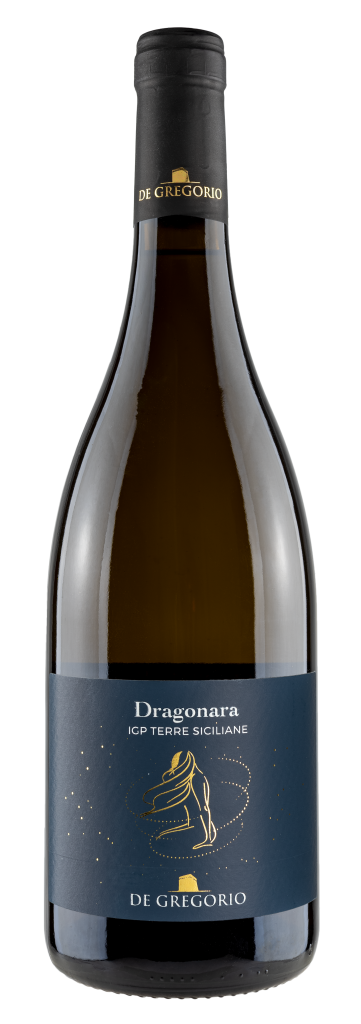Meet our new limited edition white wine: Dragonara!

Made from a selection of the best Sicilian white grapes, this new limited edition wine was brought to life to celebrate 2022 Holidays.
Its typical Sicilian personality really comes out through the floral scent that resembles orange blossom, that later becomes more citrusy, almost similar to grapefruit.
The best food pairings for this wine are savory dishes, crustaceans and blue cheeses, but its versatility will ensure a good combination with most Mediterranean dishes.

If the name Dragonara rings a bell is because it’s not the first time it is used for one of De Gregorio’s labels.
The legend behind the name Dragonara has enchanted the De Gregorio family since they first heared of it, as it reppresents a link between local tradition and ancient myths.
The famous story that is still told to this day, and that keeps on being passed on from one generation to the next, talks about an enchatress, a beautiful witch with long wild hair that went by the name Dragonara. She falls in love with a sailor, who at first returns her love but later cheats on her. Dragonara, blind with fury, unleashes a tornado at sea that will swallow whatever and whoever gets into its path, turning ships upside down and devouring men and fish.
The vortex caused by Draonara, according to local lore, can only be calmed down by cutting through it with a blade, and this could only be achieved by a gifted person who had received a special blessing on Christmas day at the Chiesa Madre (the main Church of the City) by an elder.
Also, the gifted person needed to pronounce the following enchantment while cutting through the vortex:
Ti tagghiu la testa, li mani e li denti
I cut open your head, your hands and teeth
They furthermore needed to move the blade a certain way until the storm was over.
Telling the tale of Dragonara is a way to remember the legends and beliefs of the past and to handing them down to posterity so that future generations will know where our culture and traditions comes from.
It is also a way to understand the human side of the the stories we tell (and live in our daily lives): betrayal, deceit, manipulation and (therefore) vengeance, were once the main theme of Greek mythology.
Just think that in the very first works of European Literature, The Iliad and The Odissy, events are set in motion when something or someone is triggered and starts to seek vengeance.
Vengeance, when we look at ancient greek and latin mythology, is the emotion that more than any other makes gods human and relatable.
Myth helps us understand and feel commpassion towards the human error: and so the enchantress that unleashed a tornado at sea becomes the deputy of scorned, betryed and hurt women, and her merciless actions help to balance out not only the story itself, and also, by extension, who empathizes with it.


+ There are no comments
Add yours